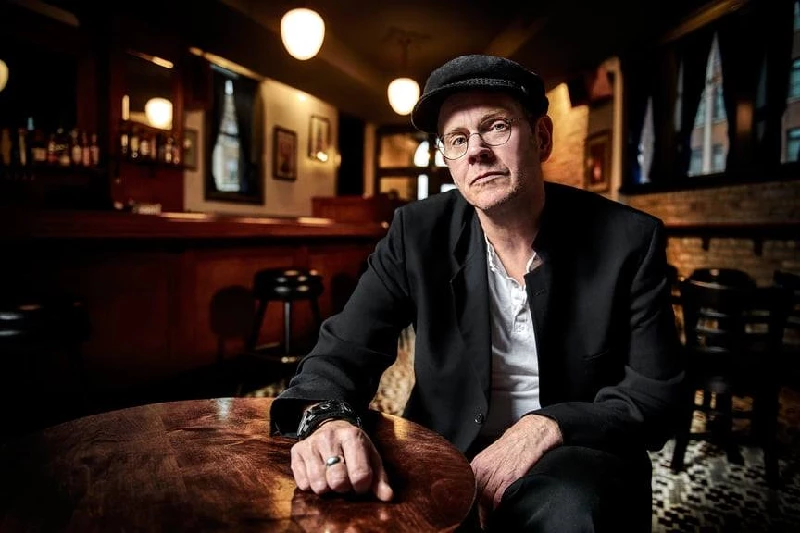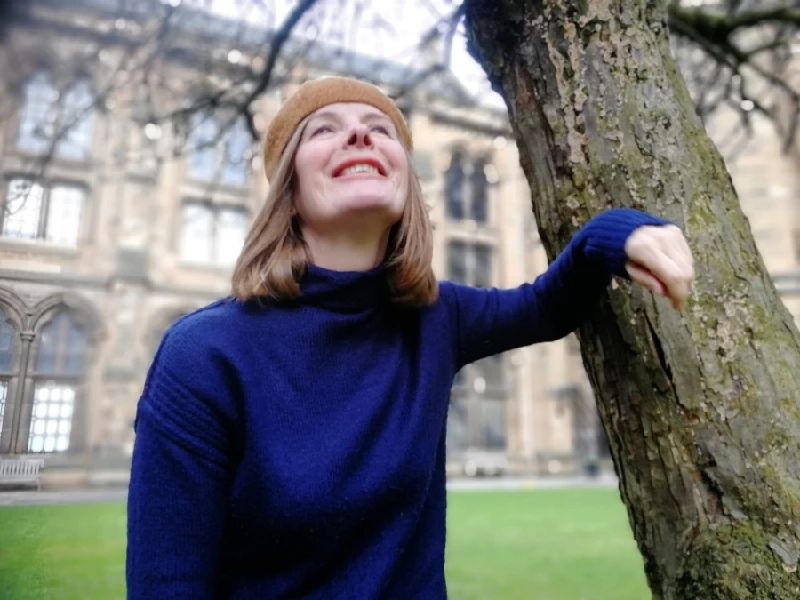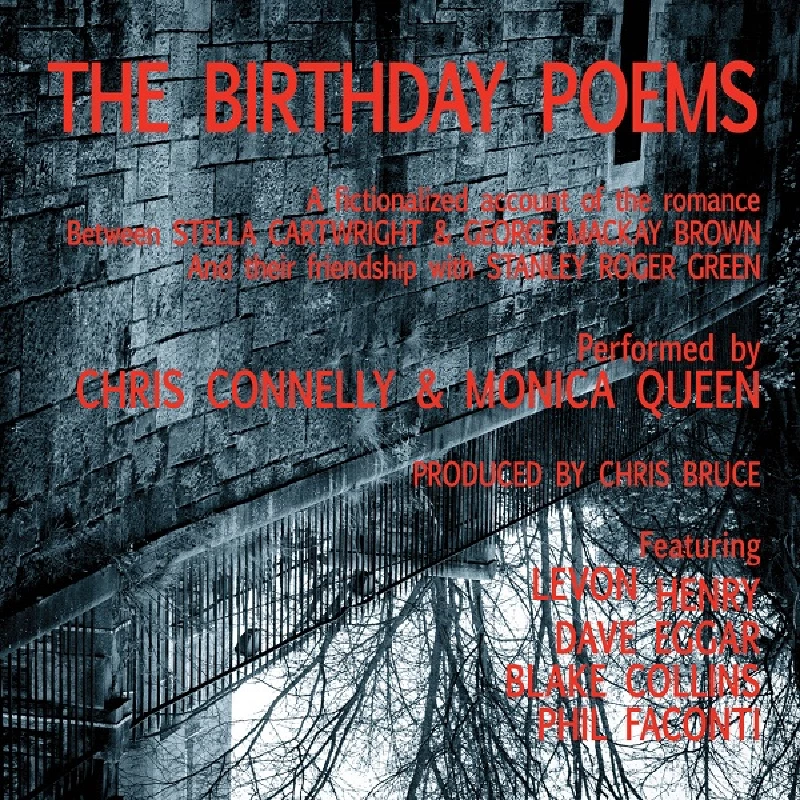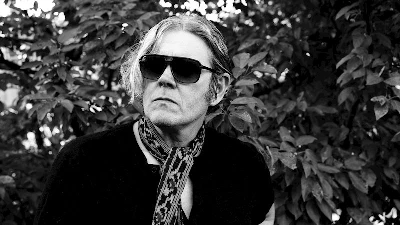Situated behind Princes Street and on the edge of the New Town, Rose Street in Edinburgh is a street of narrow walkways and alleys, tall tenements and pubs, many of which have been there for decades. It is here that much of the backdrop to Chicago-based but Edinburgh-based musician and songwriter Chris Connelly’s new album ‘The Birthday Poems’ takes place, which describes itself on its cover as “a fictionalized account of the romance between Stella Cartwright and George Mackay Brown and their friendship with Stanley Roger Green.” On the opening track ‘My Father Took Me Everywhere’, fifteen-year old only daughter Stella, a pupil at expensive all girl’s school Mary Erskine’s, is taken out to theatres and bars by her father, Jack, who is an aspiring artist. Knowledgeable about literature from an early age, the extrovert Stella is introduced by him to a group of poets who hang out collectively in Rose Street’s smoky bars in the late 1950s and early 1960s, and becomes their ‘muse’ and the subject of many of their poems. She has affairs with some of them, including Tom Scott, whose marriage breaks up as a result; spends a platonic night with and develops a strong friendship with Green on ‘Stella, Stan and Dostoevsky’, and begins a romance with Mackay Brown, Mackay Brown, another student and aspiring poet, is so cripplingly shy that when he is invited to come and socialise with ‘The Rose Street Poets’ by one of their number Sydney Goodsir Smith he initially turns him down on ‘Tae the Poets’. Although there is a seventeen-year age difference between George and Stella, and she is only nineteen, they become engaged, after enjoying lovers’ walks together down the Water of Leith on ‘A Rain Soaked Idyll’. The romance is, however, short-lived, and they break up when a homesick George, suffering from ill-health as a result of Edinburgh’s pollution, returns to his native Orkney on ‘O Blessed Saint Magnus’. The two maintain a solid but tempestuous friendship although Mackay Brown rarely visits Edinburgh, with him writing Cartwright a birthday poem every year until her death in 1985. As George’s poetic and literary career takes off, Stella’s circumstances, however, decline. She falls into alcoholism, continuing to frequent the same bars in Rose Streer long after its literary scene has faded away, and her own writing career comes to nothing. When Stanley Roger Green goes to visit his old friend on the penultimate title song, he finds her greatly aged and walking with the aid of a frame. She dies alone at the age of 47 in her bedsit on the last track ‘From a Dreamer’s Shore’, with even her father having abandoned her, and from amongst the Rose Street Poets it is only the loyal Green who bothers to attend her funeral at Warriston Crematorium. Stella is played by former Thrum singer and Glaswegian singer-songwriter Monica Queen, and Connelly takes on the twin roles of Mackay Brown and Green. As well as Connelly on acoustic guitar, bass and keyboards, ‘The Birthday Poems’ also features its producer Chris Bruce on electric guitar and additional bass and keyboards, Dave Eggar on cello and strings, Levon Henry on saxophone, Blake Collins on mandolin and Phil Faconti on guitar. The eighteen track ‘The Birthday Letters’ combines together scorching post-rock numbers, wistful folk ballads and drinking songs with imaginary poems and spoken word letters between George and Stella. In interview, Chris Connelly spoke to Pennyblackmusic about ‘The Birthday Poems’. The veteran of over thirty albums with his former 1980s and 1990s’ bands Finitribe, Revolting Cocks, Ministry and Pigface and in his solo career, Connelly is also a writer. He has published a memoir ‘Concrete, Bulletproof, Invisible and Fried’ about his time in the controversial Revolting Cocks, a psychological thriller ‘Ed Royal’ which set in Edinburgh in the 1980s, and collected together 350 of his poems and lyrics in a book, ‘The Heart Has to Ache Before It Learns to Beat’. ‘The Birthday Poems’ builds on both his talents and is a fusion of rock and literature. PB: When did you first learn about George Mackay Brown and Stella Cartwright? CC: I learnt about their relationship about three or four years ago when I read a book called ‘A Clamjamfray of Poets’ by the poet Stanley Roger Green, which is a really great, small book, and goes poet by poet through all the Rose Street Poets and talks about them and Stanley’s relationship with them. There is a chapter on Stella and a chapter on George. Stanley Roger Green is an important figure for me because I grew up with his kids. PB: Did you know him as well? CC: I didn’t know him because the parents were separated. I knew his ex-wife and I knew the kids. I always wanted to meet him but I never did. I always loved his poetry and then I started reading that book. The relationship with George and Stella really connected with something in me. PB: You spent two years researching the material that makes up ‘The Birthday Poems’. What were your main sources beyond Stanley’s book? CC: Maggie Fergusson wrote a biography on George Mackay Brown called ‘George Mackay Brown; The Life’, and George himself wrote a autobiography called ‘For the Istands I Sing’, but apart from that it was really hard work because all the Rose Street Poets are dead now. I grew up with a couple of girls called Mary and Jane Brown, who, however, are the daughters of Dolina Maclennan, who is a Gaelic singer who also knew Stella and George, and so I interviewed her. I was over in Edinburgh a couple of years ago and we got together and talked, and so she helped to set the stage for what was going on at that time. It was kind of like rock and roll before there was rock and roll. This was the 50s, but it was poets rather than rock musicians who were getting together and partying (Laughs). PB: Stella was quite a contradictory, elusive character. Some sources describe her as being beautiful, but others as not very attractive. Others say that she was not very intelligent and some as very bright and articulate. She never published anything but she apparently did a lot of writing. Was part of the appeal of doing this project unearthing what kind of person she really was? CC: It definitely was. There are a stack of George and Stella’s letters in the National Library in George IV Bridge in Edinburgh, and I could not access them. I was not allowed permission which was frustrating as I was over in Scotland at the time. So, I had to use my poetic licence (Laughs) to tell a lot of it. I tried to paint as accurate a picture of George and Stella’s relationship without having all the necessary information. I don’t know whatever happened to her writing. It is one of the question marks in the album, and I ask a lot in the lyrics about the kind of writer she was. I personally think that she was probably a great writer. PB: You have described her as a “beautiful treasure.” Why do you think that? Stella was clearly very flawed. CC: She was a beautiful treasure in the way in that she would walk into the Abbotsford Bar in Rose Street and shine. All these men would gather around her and there was clearly an energy about her. Yes, she was flawed. She was a terrible alcoholic certainly and that eventually brought about her demise, but she had all these poets like Tom Scott and George Mackay Brown totally under her spell. They just loved her and hung on every word of hers, but at the same time they didn’t encourage her to develop her own writing. It is very ironic that they wouldn’t encourage that or nurture that in her. PB: Do you see her a victim of 50’s and 60’s culture and sexism? CC: Yes, absolutely. At that time women were supposed to be a certain way. There is still something of a boys’ club even now. Women are still victims of it, They would not let her grow and who knows what would have happened if she was allowed to flourish. They wanted to sleep with her. They wanted to hang out with her and enjoy her company, but yet they wouldn’t let her grow as a creative force. It never happened for her, and I think sexism played a huge part in that. PB: What do you make of her father? He took her down the pub and got her into drinking from the age of fifteen, and then abandoned her at the end. CC: Her dad enjoyed painting, and he liked hanging out with creative people, and that is why that happened. It was gross negligence taking her out to bars, but I think he also saw in her a keen intelligence, the sort of intelligence that was not taught at Mary Erskine’s School. She was reading James Joyce and Zola, and at one level I am really grateful that she did meet these poets because it really helped open up her mind to music as well to art and culture. Introducing her to whisky at that age was, however, a really dreadful idea. PB: George and Stella were briefly engaged and maintained a friendship of sorts for the rest of Stella’s life. He didn’t like living in the city and its smoke and pollution affected his health, while she loved living there. Do you think they were basically incompatible? CC: Yes. In Maggie Fergusson’s book it is never stated, but there are insinuations that he may have been gay, and there are insinuations in the book that he could not consummate their relationship, but, however, she was okay with this. Although it never happened, she was supportive of him and loved him and they continued to be friends, PB: In the song ‘The Lowland Fulcrum’ on the album you reference that he was born in 1921 and she was born in 1938. Do you think the age difference was also a factor? CC: I do. She was used to be around older men, which was why I mentioned it. I don’t think that it was a major problem at that point, but his desires and his needs were probably different from hers. She was kind of used to that because all the other men she had had relationships with like Tom Scott were older as well. I think that the age difference will always be an article of consideration in something like that, but at the same time there was a spark between them and they did enjoy each other’s company. although it could be tempestuous at times. PB: Monica Queen is absolutely fantastic as Stella. Why did you choose her for the role? What were you looking for from her? CC: I had always really connected with her voice and really loved it. Before I approached her, the whole album concept was going around and around in my head and I knew that if it was going to be done properly I had to have someone else singing on it. There had to be a female singing on it. I was thinking of finding an actress who could sing, but I didn’t go very far with that. It just hit me one day: Monica Queen. I just love her voice. I just hear this entire soul thing when she sings. It is uncanny. It is beautiful. We started talking, and I sent her demos for a few songs. The first song she sent back to me was the first track on the album, ‘My Father Took Me Everywhere’, and her partner Johnny Smillie sent me a rough mic of it, and I was like, “I was right. This is the person who has to play Stella.” I could just feel her. There is much humour and empathy and anguish and sadness in Monica’s voice. It is just gorgeous. PB: Did you give her much guidance or did you leave her to put her own stamp on it? CC: I just made it quite clear to her that she should go with it. She could run with it. I sang the songs and sent her place markers where I thought the vocals should be, but she played around with it a lot and brought plenty to the table as I knew she would. One of my favourite stories is when Miles Davis would work with musicians on things like ‘Bitches Brew’ he would bring a rough sketch to the studio. He would work with people who were intuitive. He wouldn’t tell them what to do. He knew they would, and Monica did the same thing. I gave her some sketches and said, “Here’s the words! Do what you do!” and she did it. It worked really well. PB: You take on the roles of Stanley and George. How easy was it to get into their characters and voices? CC: George was a little harder than Stan. Stan was really easy for me because I am still friends with his son Malcolm Green, and I have been friends with him since the mid-70s and I know the way he speaks, so I used Malcolm as a guide to how Stanley talked, so that was easy for me. I used to play music with Malcolm too. I have heard him sing, but George was different because I wasn’t going to do an Orkney accent (Laughs). I just put that to the side. I just went with the words that were emulating and tried to breathe life into them without impersonating George Mackay Brown. There are poems on the record like ‘My Heart is a Plough on This Wilderness Field’. which is done as a sort of poem that he might write. It was inspired by his writing. I wasn’t going to go and get permission to read his poetry, because approaching anyone for permission is so hard and I don’t have the patience, so I thought, “I am going to try and write it myself. What would a poet do? Just make it up! Do it! Write poetry!” George was a little tougher definitely. PB: Stanley Roger Green appears on the first two tracks on the album, ‘My Father Took Me Everywhere’ and ‘Stella, Stan and Dostoevsky’, and the penultimate one, ‘The Birthday Poems’. Do you see him a kind of Greek chorus? CC: A friend of mine in Scotland, Lindy Cameron, who I talked to a lot about this project, suggested that Stan was like The Great Gatsby, sort of standing back and watching this whole thing and commenting on it. Stan was the one person in her life from the age of nineteen up until the end who was in a sense always there. Although their contact was not frequent latterly, he still saw her and checked in on her until she died. I see him not so much a Greek chorus but just someone who was on the scene. He was the guy who kept tabs on all these poets (Laughs). As well as being a poet himself, he chronicled them with ‘A Clamjamfray of Poets’ PB: Was it a difficult album to record with both Covid restrictions and the fact that Monica was in Scotland and you are in the States? How did you get around that? CC: It was not hard because I have always worked remotely anyway. These days making records at home I can collaborate a lot with people by sending files back and forth. When I started doing it I had already done a record during lockdown, and I have to say that my friend Chris Bruce, who produced the album and is in New York, really pulled it together. He found Levon Henry to play the saxophone on it and Dave Eggar to do the string arrangements. We were all in lockdown and bored out of our minds, so it was easy. The only hiccup was that at the time I approached Monica they were in total lockdown and she couldn’t get to the studio she uses regularly, but it happened eventually. It was a lot better because there was a lot less bureaucracy. You are just dealing with your pals. We weren’t in a hurry. PB: Last couple of questions! You say in your press release that “as a child and younger man in Edinburgh, I walked the same streets, drank in the same bars and walked the same hills.” You now live in Chicago rather than Scotland. Do you think that being able to look at this from a distance benefitted the album? CC: Yes, absolutely. I did a record ‘New Town Nocturnes’ a few years ago with an Edinburgh artist called Michael Begg, and all the tracks on it were poems about Edinburgh. One of my oldest friends heard it and said, “Wow! I had never considered this. I guess because I have lived here since 1970. I had never thought about it that way.” ‘The Birthday Poems’ was also like that. I miss Edinburgh terribly and in looking at it I do romanticise it a lot. At the same time I have not been to Orkney since 1967 when I was three with my mum and dad and brother, but having lived on the coast of Scotland and in reading so much George Mackay Brown I was able to evoke it and the sea through my imagination. You should see where I live in Chicago (Laughs). There is nothing interesting here except the inside of my brain. PB: Do you hope to bring ‘The Birthday Poems’ eventually to a British and Scottish audience? CC: I would really love it. I have said this in a couple of other interviews in the hope that they will read it, but I want the Festival of St. Magnus in Orkney to invite me to come and play there (Laughs). I think that would be wonderful. PB: What are your other plans for the future? CC: I like this way of writing, historical fiction in song form. It is really fun for me. I don’t have any definite ideas as of yet, but I am very keen to keep doing it. PB: Thank you.
Band Links:-
https://chrisconnelly.com/https://www.facebook.com/ChrisConnellyOfficial
https://twitter.com/Connelly_Chris
Play in YouTube:-
Have a Listen:-
Picture Gallery:-




intro
Edinburgh-born but now Chicago-based singer-songwriter Chris Connelly talks to John Clarkson about his new album 'The Birthday Poems', which recorded with Monica Queen, is a fictionalized account of the romance between Stella Cartwright and poet George Mackay Brown .
interviews |
|
Interview (2022) |

|
| Edinburgh-born but now Chicago-based singer-songwriter Chris Connelly talks to Eoghan Lyng about his new concept album 'Eulogy to Christa', which is about the life of Velvet Underground singer Nico. |
soundcloud
most viewed articles
current edition
John McKay - InterviewCathode Ray - Interview
Robert Forster - Interview
When Rivers Meet - Waterfront, Norwich, 29/5/2025
Spear Of Destiny - Interview
Fiona Hutchings - Interview
Carl Ewens - David Bowie 1964 to 1982 On Track: Every Album, Every Song
Chris Wade - Interview
Shrag - Huw Stephens Session 08.12.10 and Marc Riley Session 21.03.12
Brian Wilson - Ten Songs That Made Me Love...
previous editions
Heavenly - P.U.N.K. Girl EPBoomtown Rats - Ten Songs That Made Me Love....
Manic Street Preachers - (Gig of a Lifetime) Millennium Stadium, Cardiff, December 1999
Allan Clarke - Interview
Oasis - Oasis, Earl's Court, London, 1995
Barrie Barlow - Interview
Beautiful South - Ten Songs That Made Me Love...
Pixies - Ten Songs That Made Me Love...
Chuck Prophet - Ten Songs That Made Me Love...
Dwina Gibb - Interview
most viewed reviews
current edition
Peter Doolan - I Am a Tree Rooted to the Spot and a Snake Moves Around Me,in a CircleVinny Peculiar - Things Too Long Left Unsaid
Garbage - Let All That We Imagine Be The Light
Vultures - Liz Kershaw Session 16.06.88
John McKay - Sixes and #Sevens
Little Simz - Lotus
HAIM - I Quit
Pulp - More
Lapsley - I'm a Hurricane, I'm a Woman In Love
Billy Nomates - Metalhorse
Pennyblackmusic Regular Contributors
Adrian Janes
Amanda J. Window
Andrew Twambley
Anthony Dhanendran
Benjamin Howarth
Cila Warncke
Daniel Cressey
Darren Aston
Dastardly
Dave Goodwin
Denzil Watson
Dominic B. Simpson
Eoghan Lyng
Fiona Hutchings
Harry Sherriff
Helen Tipping
Jamie Rowland
John Clarkson
Julie Cruickshank
Kimberly Bright
Lisa Torem
Maarten Schiethart